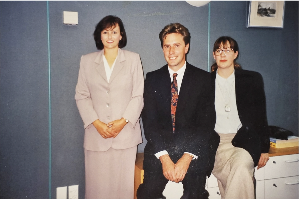Transitioning an advice business in the 21st century
David Boyle looks back over his career in financial services and asks when it's time for an adviser to exit their business how can they do it?
Monday, August 21st 2023, 6:00AM
by David Boyle

I’ve always been a strong advocate for advice ever since my parents taught me the basics about money when I was growing up. What I came to realise over many years is that most people didn’t get that level of support like I did. That’s why I have always believed the value of good quality advice to this day.
My first introduction to financial planning was way back in 1993 when I joined UDC Finance as a business development manager for the South Island. I replaced Fiona Fourie who just left to go to a relatively new company called Armstrong Jones.
I remember landing at Christchurch airport with a laptop (black and white screen), being picked up by my wife in my new company car, which had a Bell South car phone. I thought I had made it and was excited to get into an industry that I thought was more suited to my skill set around relationship management and my passion of helping Kiwis reach retirement in a better place.
 The UDC offices were located on Cambridge Terrace in a building aptly named Investment House. Coming from ANZ/Post Bank I thought I knew everything I needed to know about investments even managed funds, because we had a range of funds including a third party offering from an Australian fund manager called Equity Link. (Picture: A young David Boyle with Wendy Gatley - right).
The UDC offices were located on Cambridge Terrace in a building aptly named Investment House. Coming from ANZ/Post Bank I thought I knew everything I needed to know about investments even managed funds, because we had a range of funds including a third party offering from an Australian fund manager called Equity Link. (Picture: A young David Boyle with Wendy Gatley - right).
As it transpired after a few visits around the South Island, seeing some rather colourful financial advisers and insurance brokers, I realised there was much more to learn about this advice business and rather quickly.
If not, a new career was going to be needed. If it wasn’t for Paul Murphy (a well respected financial adviser in Christchurch), I suspect I would not have had the 30 year career I’ve enjoyed in financial services.

Paul (pictured above) took me under his wing and would spend a number of Friday afternoons in the early days showing me how debentures fitted into his client’s portfolio and gave me a great foundation on what holistic financial planning was all about.
He introduced me to his clients and I would listen to them about why they loved working with Paul and the amount of trust that was developed between them.
My relationship with him and a large number of financial planners grew over the years especially during my career at Armstrong Jones, ING, ANZ Wealth and ultimately Mint Asset Management. Even my four year stint at the Retirement Commission had connections with the advice industry from KiwiSaver, to accrediting advisers for employer Sorted presentations.
A highlight was being appointed to a steering committee by the government to review The Financial Advisers Act. Which ultimately lead to the new licencing regime that came into play in March of this year.
Where did that 30 years go?
The industry has gone through many changes over that period, mostly for the better. We also had to endure a number of world events during that time that impacted markets, fund managers, advisers and their clients. These included the bond market crash of '94, Y2K, the 2000 Tech Wreck , the Credit Crisis of 2008, 9/11 and of course Covid to name just a few.
Over those 30 years we also lost a number of industry and advice trail blazers (many you might know) including my good friend Paul Murphy.
To manage the client’s life changes, notwithstanding market volatility, is not only character building, but can test the conviction of your work and the benefit you are providing to your clients.
I caught up with Paul maybe a year before he passed away and we reminisced a little on what we called the good old days. The one thing he said to me that struck a nerve, was the difficulty he had finally letting go of his baby (his business) and his clients who he had grown up with over all those years.
I could empathise a lot with what he meant by that. Unlike most other industries where you sell something, or make something, or lend something, it’s primarily a transactional relationship with the client. The industry of taking clients hard-earned savings and bearing the responsibility to develop a plan, then ultimately invest those savings that will meet their short, medium and long term goals not to mention help navigate life’s little hiccups along the way, was to me, and still is, a significant responsibility.
A responsibility not lost on a number of advisers I know today.
To manage the client’s life changes, notwithstanding market volatility, is not only character building, but can test the conviction of your work and the benefit you are providing to your clients. You are not just the person who looks after their money, but in many cases you have been their confidant and sounding board as well.
Many advisers of that era are now, not only dealing with their clients decumulation requirements, but also their whānau and extended family needs as well.
Many advisers love their work so much, the idea of retiring is not something they have seriously contemplated, but is this in the best interests of their clients?
While they have happily helped transition their clients from working life to retirement life, this cannot be said for some adviser’s own retirement plans.
While there are those that have a long-term strategy in place, many are still finding themselves in a difficult transition. The analogy of a builder's house comes to mind, its likely their house is still not completed because they have been so busy helping others with theirs. However, its more complicated than that for financial advisers.
The main reason for this is a number of advisers are “The” business. Many advisers love their work so much, the idea of retiring is not something they have seriously contemplated, but is this in the best interests of their clients? Quite possibly if all things go well health wise and you quietly glide along, but that’s not always how life works.
That’s why succession planning is something many advisers across New Zealand are still struggling to come to terms with. The new regulation has tested a number of convictions around the robustness of their business and in particular their business continuity. Which means in the event they could not work for an extended period of time, what would happen to the wellbeing of their clients and who would look after them if something went wrong?
I know for a fact this has caused some advisers to really question the viability of their business and whether they could continue in the new regulatory environment. While many have found a solution of sorts, it’s business continuity and a far more challenging regulatory environment to work in, that has caused some to think twice about becoming licenced under the new regime in 2023.
Thank goodness most took the challenge to proceed through no small effort by the FMA, and Financial Advice NZ to help those get over that first hurdle.
There are a number of advisers I know, running incredibly successful businesses and some have got a succession plan in place. But many have found it difficult to find someone who will be able to work with their clients and ultimately become their succession plan.
The risks have always been high to bring on new advisers. Clearly there is a financial cost.
Then there’s the time training them in your processes and aligning them to your philosophy, advice and investment approach.
The other risk is after investing all that time and money the younger adviser decides it’s not their vocation after all and leaves the industry, or they are poached by another advice provider. I’ve seen this happen time and time again over the years much to the frustration of the owner.
To help mitigate the latter, principals of the business will generally offer, the promise to sell equity in their business, at an agreed price hopefully using a third party to ensure fair market value has been ascertained.
This has been quite appealing for some and a great way to ensure business continuity and service to the current clients, however this is not as attractive as it was a few years ago. The main reasons being the increase in costs to meet the regulatory requirements, and higher lending rates for those wanting to buy a shareholding in the advice practise.
Add the increases in living expenses, market volatility, and investor confidence, some may question if the time is right (about the viability) of buying into an unknown future.
What advisers are telling us
We (Amplifi Group*) have talked to around 40 financial advice practises around New Zealand over the past 12 months to get an idea on where they are today and how we might be able to help advisers with their future business transitions.
There have been a number of common themes that we have identified, and these include:
- Their day to day activity hasn’t really allowed them to plan and think too far ahead in the future
- They haven’t been able to find new advisers to buy into the business
- They are happy to just keep doing what they are doing and slowly wind-down their practise, mindful if a health event occurs then this would be a challenge
When dealing with New Zealanders financial circumstances it’s a privilege to be able to gain that level of trust you need so you can get the best possible outcomes for your clients. It requires an intimate understanding of their circumstances that is unlike most other industries.
This is where the challenge lies to transition an advice business to a new owner, while ensuring the client continues to get the same level of advice they have become accustomed to.
What's next?
Over the coming months we are going to release two further articles on what the barriers to sale are. We will dig deeper into some of the fundamental business structural issues of financial advice businesses, and provide some more practical insights to help advisers understand what the options are available to them.
As Paul said “it’s hard to let go of your baby”, but every parent has to let go at some stage.
What’s important is that you allow some time to plan ahead, work out what your short, medium and long term goals are, before you sell and think about the options that work best for you and your clients. The good thing is there are options available now to help you transition when the time is right.
*Amplifi Group is a financial services provider that owns Mint Asset Management, Sage Wealth Management, Totara Wealth Management
David Boyle is Head of Sales and Marketing for Mint Asset Management Limited. The above article is intended to provide information and does not purport to give investment advice. Mint Asset Management is the issuer of the Mint Asset Management Funds. Download a copy of the product disclosure statement at www.mintasset.co.nz
| « Harbour Navigator: Decarbonisation progress – more than hot air? | Thoughts on underperformance by an active manager » |
Special Offers
Comments from our readers
No comments yet
Sign In to add your comment
| Printable version | Email to a friend |









